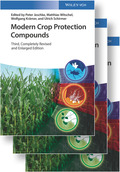Modern Crop Protection Compounds

3. Auflage März 2019
1784 Seiten, Hardcover
800 Abbildungen (50 Farbabbildungen)
300 Tabellen
Handbuch/Nachschlagewerk
Kurzbeschreibung
Aktualisiertes Referenzwerk zu dem Fachgebiet, von renommierten Autoren bei führenden Agrarunternehmen. Drei Themenbände behandeln Herbizide, Fungizide und Insektizide, deren chemische Eigenschaften, Wirkungsweise, kommerzielle Nutzung und industrielle Synthese.
Jetzt kaufen
Preis: 580,00 €
Preis inkl. MwSt, zzgl. Versand
Euro-Preise für Wiley-VCH- und Ernst & Sohn-Titel sind nur für Deutschland gültig. In EU-Ländern gilt die lokale Mehrwertsteuer. Portokosten werden berechnet.
The leading reference on this topic has just gotten better. Building on the success of the previous two editions, all the chapters have been updated to reflect the latest developments in the field, and new chapters have been added on picolinic acids, oxathiapiprolin, flupyradifurone, and other topics.
This third edition presents the most important active ingredients of modern agrochemicals, with one volume each for herbicides, fungicides, and insecticides. The international team of first-class authors from such renowned crop science companies as Bayer, Dow AgroSciences, DuPont (now Corteva Agriscience), and BASF, address all crucial aspects from the general chemistry and the mode of action to industrial-scale synthesis, as well as from the development of products and formulations to their application in the field.
A comprehensive and invaluable source of timely information for all of those working in modern biology, including genetics, biochemistry and chemistry, and for those in modern crop protection science, whether governmental authorities, researchers in agrochemical companies, scientists at universities, conservationists, or managers in organizations and companies involved in improvements to agricultural production.
Overview
HRAC Classification of Herbicides and Resistance Development
Acetohydroxyacid Synthase Inhibitors (AHAS / ALS)
Protoporphyrinogen-IX-Oxidase Inhibitors
Herbicides with Bleaching Properties
New Synthetic Auxin Mimics
Herbicides Disturbing the Synthesis of Very Long Chain Fatty Acids
Inhibitors of Cellulose Biosynthesis
Safeners for Herbicides
Genetically Modified Herbicide Resistant Crops
Microtubulin Assembly Inhibitors (Pyridines)
Acetyl-CoA Carboxylase Inhibitors
Photosynthesis Inhibitors: Regulatory Aspects, Re-Registration in Europe, Market Trends, and New Products
New Aspects of Plant Growth Regulators
VOLUME II - FUNGICIDES
Overview
FRAC Mode of Action Classification and Resistance Risk of Fungicides
Fungicides Acting on Oxidative Phosphorylation
Fungicides Acting on Amino Acids and Protein Synthesis
Fungicides Acting on Signal Transduction
Fungicides Acting on Mitosis and Cell Division
Sterol Biosynthesis Inhibitors
Carboxylic Acid Amide (CAA) Fungicides
Fluopicolide: A New Anti-Oomycetes Fungicide
Melanin Synthesis in Cell Wall
Fungicides with Unknown Mode of Action
Recently Introduced Powdery Mildew Fungicides
Newest Aspects of Nucleic Acid Synthesis Inhibitors - Metalaxyl-M
Host Plant Defence Inducers
Oxysterol binding protein Inhibitors (Oxathiapiprolin)
VOLUME III - INSECTICIDES
Overview
IRAC: Insecticide Resistance, and Mode of Action Classification of Insecticides
Insect Moulting and Metamorphosis
Chitin Biosynthesis
Midgut - Transgenic Crops expressing Bacillus thuringiensis Cry Proteins
Metabolic Processes
Nervous System
New Unknown Mode of Action
Nematicides
Insecticides Affecting Calcium Homeostasis
Matthias Witschel gained his PhD in 1994 at the University of Erlangen-Nürnberg (Germany). During his education, he also worked as a visiting researcher at UC Irvine (USA) and the College de France, Paris (France). After his post-doctoral stay at Stanford University (USA), he started in 1996 at BASF in herbicide research, where he is now senior principal scientist in global herbicide research, based in Ludwigshafen (Germany). Dr. Witschel is the author and co-author of over 270 patents and scientific publications.
Wolfgang Krämer gained his PhD in organic chemistry from the TU Stuttgart (Germany) in 1968, after which he joined the Institute of Textile Chemistry at Stuttgart University, before moving to Bayer Plant Protection as lab leader in crop protection research in 1970. Between 1984 and 1990 he was Head of Global Chemistry Fungicides, and Head of Insecticide Chemistry thereafter. Retired since 2005, Dr. Krämer has over 250 patent applications and publications to his name.
Ulrich Schirmer received his PhD in organic chemistry from Stuttgart University (Germany) in 1973, and subsequently carried out his postdoc at Paris-Orsay (France). He joined BASF in 1974, eventually becoming Senior Vice President responsible for plant protection research for chemical synthesis, process development and biological R&D. Since 2003, he has been working as a freelance consultant to start-ups in the fields of biotechnology, chemistry and agriculture. Dr. Schirmer is author and co-author of more than 100 patent applications and scientific publications.


